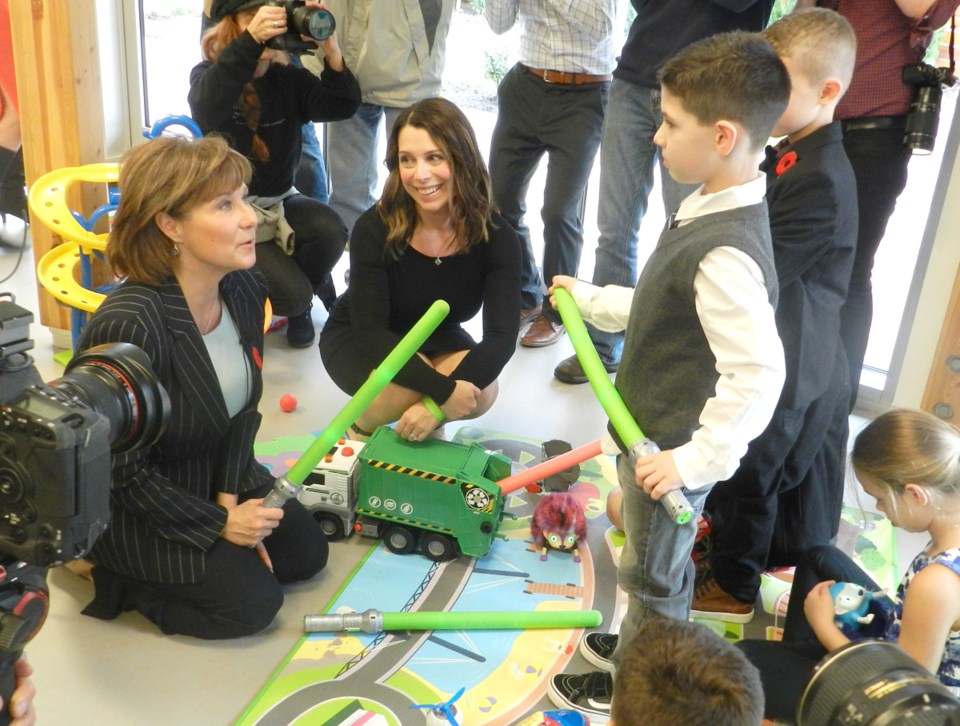It’s been a long journey, but those who witnessed the opening of a new Sea Island facility on Wednesday afternoon to help those with autism, and their families, are confident the benefits will be felt across B.C. for many years to come.
Wendy Lisogar-Cocchia — who along with her husband, Sergio Cocchia, spearheaded the project — told the audience that it has taken 3,295 days for the dream that is the Goodlife Family Autism Hub to become a first -in-North American reality.
“Remember how you feel at this very moment, because you have changed the future of autism,” Lisogar-Cocchia said to the crowd that included Premier Christy Clark, who helped cut the ceremonial ribbon and toured the $28 million, 58,000-square-foot facility just north of the BCIT Aerospace Campus on the middle arm of the Fraser River.
The province provided $20 million to set up a long-term provincial autism centre, the role of which is to centralize information, among many other needs, added Lisogar-Cocchia.
“A doctor recently said it best to me; families need one phone number, one website and a place to start, as the challenges are vast and serious in autism.”
According to the Pacific Autism family network, there is an estimated 69,000 people living with autism and related disorders in B.C, with approximately 600 new cases each year.
The facility — in addition to being a learning centre — provides a hub for families needing support, with specialists across all areas, and a variety of programs focused on lifespan and transition, clinical practices and assessment of individuals with autism.
Among the areas the premier toured were a music recording studio that assists with music therapy, a specially designed lab that promotes calm and other soothing distractions, such as a water bubble machine, while drawing blood samples and apartment-style, living quarters that provides a real life learning opportunity for older individuals to develop or fine tune, self-care and living skills.
“This gives us the opportunity to sit there with the young person and teach them how to make that spaghetti they love,” said Sergio Cocchia during the tour. “It might take 100 times for that to happen, but they’ll get there.”
“It’s fantastic life skills training for those across the (autism) spectrum,” Lisogar-Cocchia said.
“For example, how to use a fork and knife can still be challenging for a lot of individuals. Working on those fine motor skills here can be so helpful to so many.”
Those using the space will also learn other basic skills, such as making a bed and doing laundry.
One unique aspect of the hub will be its ability to extend its reach across the province through modern communications technology to deliver workshops. As well, additional regional locations developed in the near future outside of the Lower Mainland will deliver information and expertise first-hand.
Richmond Mayor Malcolm Brodie said it was a great feeling to see the project completed for a condition that, in previous generations, was not widely discussed.
“We have come light years from that time, are far more aware today and have made huge strides,” he said, adding in B.C., the impact autism has on the population, including family members, friends and acquaintances of those diagnosed affects one in 20 people.
“And every (diagnosed) individual is unique in terms of their need for support,” Brodie said. “So, there are tremendous challenges when you are trying to secure for them the appropriate level of service.”
Lisogar-Cocchia said divorce rates and parental suicide are also higher in families that have a child diagnosed with autism.
“When our son was diagnosed with autism it was devastating,” she said. “The doctor actually said to us, ‘Go home and enjoy your other child. He’ll probably never speak.’
“How ridiculous. If that doctor could only see the last 20 years that we have enjoyed our son each and every day,” she said.



